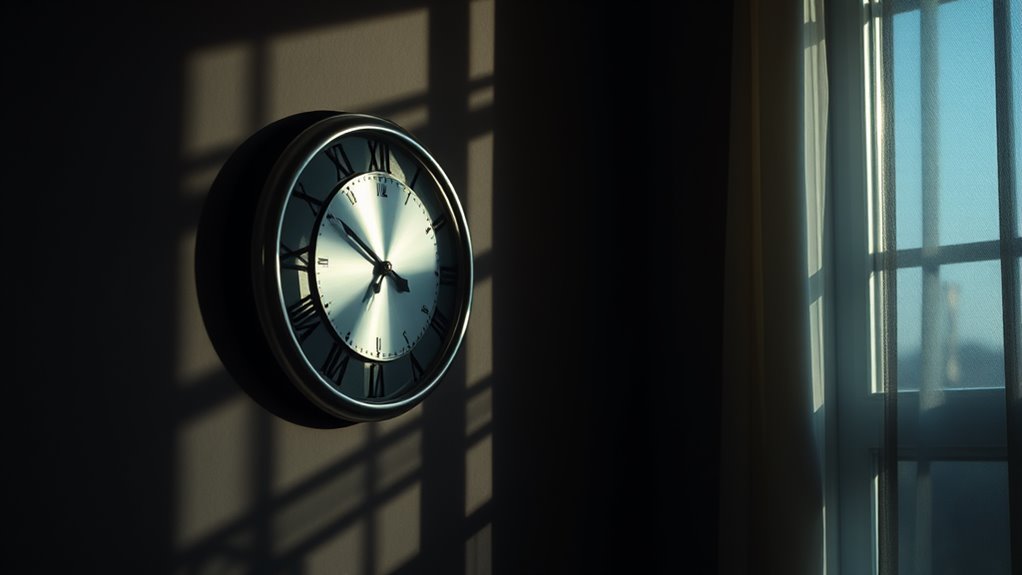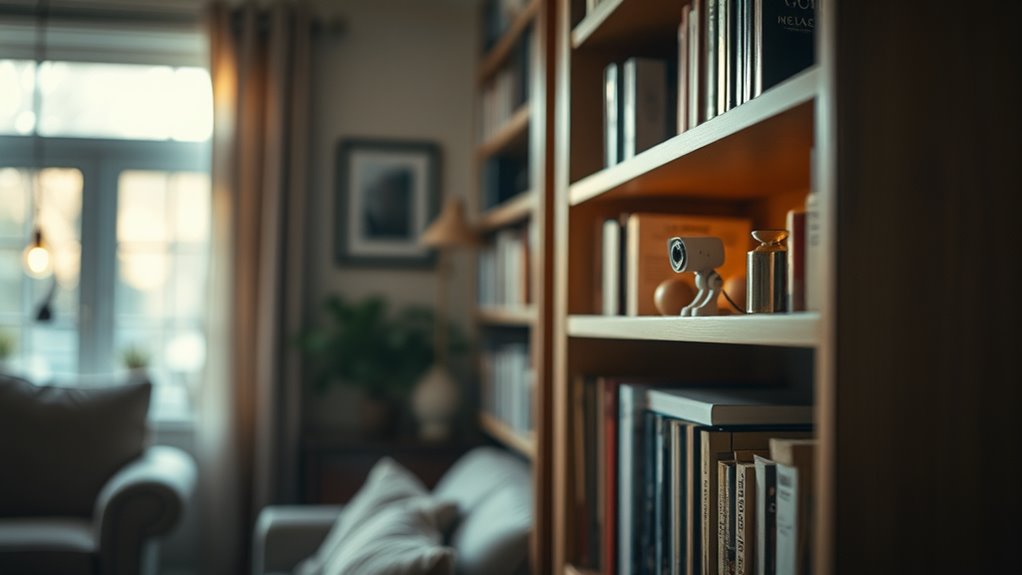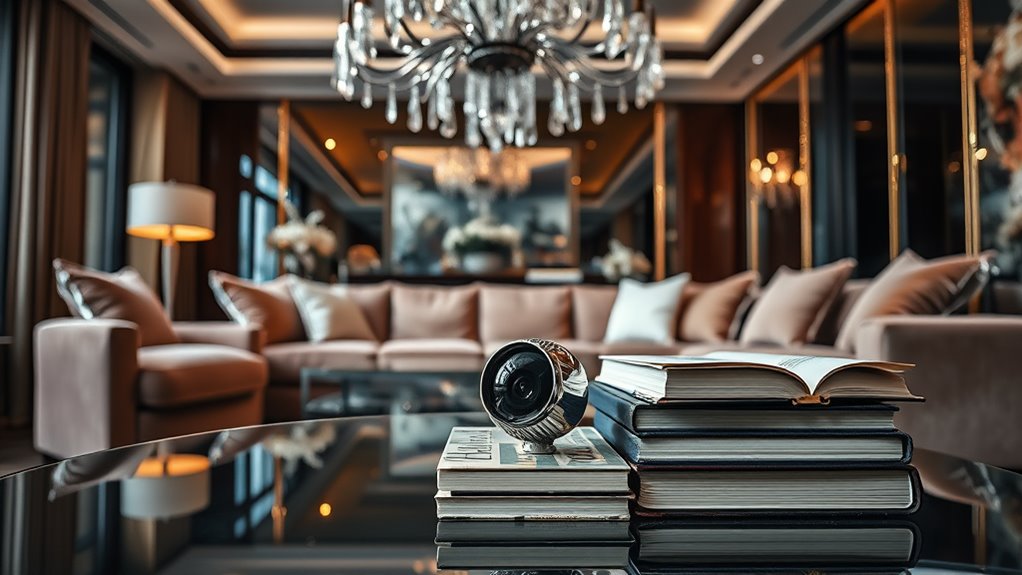You might believe hidden cameras are only for spies or that they're illegal everywhere, but that's a misconception. Hidden cameras are often legal, especially in your own home, provided you respect privacy. They're not limited to indoor use; outdoor cameras can enhance security too. Contrary to popular belief, not all hidden cameras are hard to detect. With some tech-savvy methods, you can spot them. Many assume they're expensive, but there are budget-friendly options with good features. And while some have poor video quality, others offer decent resolution. Discovering more can help you make informed decisions about hidden cameras.
Illegal Everywhere

It's a common misconception that hidden cameras are illegal everywhere. You might be surprised to learn that the legality of hidden cameras varies widely depending on where you are. Privacy laws play an important role in determining whether or not you can legally install and use hidden cameras.
In many places, it's perfectly legal to use hidden cameras in your own home, as long as you're not invading someone else's privacy. However, if you start recording in areas where there's an expectation of privacy, like bathrooms or bedrooms, that's where you could run into legal trouble.
Before you decide to use a hidden camera, it's vital to understand the privacy laws in your area. Some regions require you to inform individuals that they're being recorded, while others may not. The key here is to avoid infringing on someone's reasonable expectation of privacy. For example, devices like the Cross Hidden Spy Camera are often used for covert surveillance and have specific legal considerations.
It's not just about the legalities, though; ethical considerations should also guide your decisions. Ask yourself whether your reasons for using a hidden camera are justified and if they respect the rights and dignity of others.
Moreover, consider how you'd feel if you were the one being recorded without your knowledge. Balancing your right to protect your property or loved ones with the ethical considerations of privacy can be tricky.
For instance, using a USB Charger Hidden Spy Camera discreetly for home surveillance is legal in many areas, but always check local laws. Misunderstanding these laws can lead to unintended consequences, so it's wise to research thoroughly or consult a legal expert. By doing so, you guarantee that you're not only following the law but also respecting the privacy and trust of those around you.
Only Used by Spies
While privacy laws and ethical considerations are vital when dealing with hidden cameras, another common misconception is that they're only used by spies. You might imagine hidden cameras as secretive spy gadgets, found only in the world of espionage.
However, the reality is far more expansive. Hidden cameras have found their place in various legitimate and everyday applications, far beyond the clandestine operations of spies. For instance, businesses often use hidden cameras for security purposes. They place them in strategic locations to deter theft, monitor employee behavior, and guarantee a safe environment for staff and customers alike. In addition to businesses, hidden cameras like the Eyeglasses Hidden Spy Camera can be used for personal protection and surveillance in potentially dangerous situations.
Homeowners, too, have turned to hidden cameras to enhance security, using them to monitor their properties and guarantee their families' safety. These devices provide peace of mind by allowing you to keep an eye on your home, even when you're not there.
The Pocket Clip Hidden Spy Camera offers portability and discreetness, making it a popular choice for both personal and professional security needs.
While these uses are practical, it's important to address privacy concerns. Just because hidden cameras are more accessible doesn't mean you can use them indiscriminately.
You need to be aware of the legal and ethical boundaries. Always verify that you're not infringing on someone's privacy rights when using these devices. Placing them in private spaces without consent could lead to legal trouble.
Always Easy to Detect

In reality, detecting hidden cameras isn't always as straightforward as you might think. With advancements in technology, these devices have become smaller and more sophisticated, making them harder to spot. You can't just rely on your eyes to find them. It's essential to familiarize yourself with several detection methods to protect your privacy.
One effective detection method involves using a flashlight. By shining a flashlight around a room, you might catch a glimpse of the camera lens reflecting light back at you. This method, however, requires thoroughness and attention to detail, as some lenses are tiny and well-hidden.
Another approach is to use a smartphone app designed to detect hidden cameras. These apps can sometimes pick up electromagnetic fields or infrared signals, which might indicate a camera's presence. However, keep in mind that these apps aren't foolproof and may not detect every device.
Privacy concerns are at an all-time high, especially in spaces where you expect to be safe and unwatched, like hotel rooms or rental properties. Hidden cameras can be placed inside everyday objects, such as smoke detectors or alarm clocks, making detection even more challenging.
To address these concerns, you might consider investing in a professional bug detector, which can scan for wireless camera signals. Self Defense Products LLC offers additional dummy camera options to help deter unauthorized surveillance and protect privacy.
Ultimately, while there are tools and techniques available to help you find hidden cameras, it's important to remain vigilant and proactive about protecting your privacy. Remember, the better informed you are, the more effectively you can safeguard your personal space from unwanted surveillance.
Poor Video Quality
Despite the sophisticated technology of hidden cameras, many of them suffer from poor video quality. You might assume that every hidden camera on the market delivers crystal-clear images, but that's not always the case. The video resolution of these cameras can vary considerably, often falling short of what you'd expect from standard surveillance equipment. This can lead to blurry or grainy footage, where identifying faces or details becomes a challenge.
It's vital to understand this limitation, particularly when you're considering using hidden cameras for security or monitoring purposes.
When you're dealing with privacy concerns, poor video quality can be a double-edged sword. On one hand, it might seem beneficial if a hidden camera captures only vague images, potentially minimizing invasions of privacy. On the other hand, if you're relying on these devices to provide evidence or guarantee safety, inadequate video resolution can undermine their effectiveness.
You need to weigh these factors carefully when evaluating the use of hidden cameras in your home or business.
Hidden cameras often prioritize concealment over performance, which can contribute to their subpar video quality. Smaller lenses and discreet designs may result in lower resolution capabilities.
If you're considering purchasing a hidden camera, pay close attention to its specifications. Look for models that explicitly state their video resolution, and read reviews to gauge real-world performance.
Expensive Technology

Hidden cameras often come with a hefty price tag due to their advanced technology and discreet designs. It's easy to assume that all hidden cameras require a significant financial investment. However, this isn't entirely true. While high end models certainly offer impressive features such as night vision, motion detection, and high-definition video, they aren't the only options available.
If you're on a tighter budget, you'll be glad to know that there are plenty of budget options that can still meet your surveillance needs without breaking the bank.
When you're considering purchasing a hidden camera, it's important to identify what features are essential for your situation. High end models might boast superior image quality and extended battery life, but you mightn't need all the bells and whistles. Budget options can often provide adequate video quality and sufficient recording capability for less demanding applications.
Don't fall into the trap of thinking that lower-priced cameras are automatically of poor quality. Many budget options are designed to offer a balance between cost and functionality. You can find cameras that provide clear footage, easy installation, and reliable performance without the high price tag.
If you're new to hidden cameras, start by evaluating your specific needs. Consider the environment where you'll be using the camera and the level of detail you require. By doing so, you can make an informed decision that aligns with your budget and expectations, proving that expensive technology isn't always necessary for effective surveillance.
Limited to Indoor Use
You might think hidden cameras are only suitable for indoor use, but that's not the case. These versatile devices are equally effective for outdoor surveillance. Whether you're monitoring your front porch, backyard, or a commercial property, hidden cameras can provide an additional layer of security. They blend seamlessly into the environment, making them an ideal solution for unobtrusive observation of outdoor spaces.
When it comes to outdoor surveillance, weather-resistant hidden cameras are designed to withstand various elements, including rain, snow, and heat. Manufacturers often equip these cameras with features like night vision and motion detection, guaranteeing they capture clear footage regardless of the time or weather conditions.
So, whether you're concerned about potential intruders or just want to keep an eye on package deliveries, outdoor hidden cameras can be a valuable tool.
However, it's important to be aware of privacy concerns when using hidden cameras outdoors. While it's generally legal to record video in public areas, you need to be careful not to infringe on the privacy of others. Confirm that your cameras aren't directed at areas where people expect privacy, such as neighboring yards or windows.
Before installing, familiarize yourself with local laws and regulations regarding surveillance to avoid any legal complications.
Incorporating outdoor hidden cameras into your security strategy can considerably enhance your property's safety and security. Just remember to balance your need for surveillance with respect for privacy, guaranteeing you use these devices responsibly and legally.
With the right approach, you can effectively extend the reach of your security measures beyond your front door.
Frequently Asked Questions
Can Hidden Cameras Be Disguised as Everyday Household Items?
Yes, hidden cameras can be disguised as everyday household items. You should know these disguise techniques raise legal implications. Always check your local laws to verify you're not violating privacy rights when using such devices.
Are There Apps to Help Locate Hidden Cameras?
Yes, you can use apps to detect hidden cameras. These apps employ various camera detection methods to help identify potential devices, addressing privacy invasion concerns and ensuring your peace of mind in unfamiliar settings.
Do Hidden Cameras Have Audio Recording Capabilities?
You're wondering if hidden cameras have audio recording capabilities. Some do, but you should check audio legality in your area. Recording quality varies, so research before buying to guarantee it meets your needs and complies with laws.
How Long Can Hidden Cameras Record Without Being Detected?
In today's fast-paced world, you'd be surprised how long hidden cameras can record. Battery life is essential for recording duration, sometimes lasting several hours to days. Always check specs to guarantee you're not caught off guard.
Can Hidden Cameras Transmit Footage in Real-Time to Remote Locations?
Yes, hidden cameras can transmit footage in real-time to remote locations. You can watch live feeds from anywhere, thanks to real-time transmission technology. This enables seamless remote viewing, ensuring you're always in the loop.
Conclusion
You've learned that hidden cameras aren't illegal everywhere, aren't only used by spies, and aren't always easy to detect. They're not limited to poor video quality, not necessarily expensive, and not just for indoor use. By debunking these myths, you gain a clearer understanding of the diverse roles and capabilities of hidden cameras. Stay informed, stay vigilant, and remember: knowledge is your best defense against misconceptions and misuse. Keep your eyes open and your mind sharper.




